Chicago Matter: Independent Publishing Workshop
Aug 11, 2012
(4pm)
Workshop
On August 11th, the Graham Foundation hosted Chicago Matter, a one-day workshop organized by Tim Parsons and Michael Savona as an extension of the Zak Kyes Working With... exhibition. Referencing the format of Zak Kyes' and Can Altay's workshop, Leipzig Papers, conducted during the first showing of the exhibition at the Museum of Contemporary Art Leipzig, this workshop took meaningful objects from Chicago as its starting point.
Tables designed by Can Altay provided the setting for a group discussion and working session about various modes of independent publishing and distribution. The participants' objects and experiences were then translated into two dimensions by a variety of means using a Risograph RP3700 duplicator to form a new publication entitled Chicago Matter.
Pages from the publication will be displayed throughout the duration of the Zak Kyes Working With... exhibition. Printed in a limited edition of 150, the publication will be distributed nationally and internationally. A limited number of copies will be available for sale at the Graham Foundation bookshop while supplies last.
For more information on the exhibition, Zak Kyes Working With..., click here.

"Victor School" 2011, Digital Video, 6 minutes, courtesy Ronnie Bass.
Ronnie Bass, Daniel Bauer & Irena Knezevic
Aug 09, 2012
(6pm)
Talk
Please RSVP
As part of the Graham Foundation Breaking Glass seminar, Ronnie Bass, Daniel Bauer, and Irena Knezevic will discuss the increasing prevalence of the movie projector used as a functioning object in the gallery space. Artists such as Rodney Graham and Tacita Dean have placed the projector at the center of their practice and others such as Sharon Lockhart and Blake Rayne have used the projector alongside photographs and paintings.
Through the presentation of Bass’ work we will analyze the projection of clocktime and alternative chronotopes as a foil to the fetish of the cinematic apparatus.
Suggested readings for the discussion include:
Giorgio Agamben; "Difference and Repetition: on Guy Debord’s Films", in Tom
McDonough ed., Guy Debord and the Situationist International, MIT Press, 2002
Boris Groys, “Comrades of Time”, Eflux Journal #11 December 2009.
Tom Gunning, "Animated Pictures: Tales of Cinema's Forgotten Future" Michigan Quarterly Review, Fall 1995
Jonathan Crary, “Spectacle, Attention, Counter-Memory” October, Vol. 50 (Autumn, 1989), pp. 96-107
Daniel Bauer holds a BFA from Bezalel Academy of Art and Design, Jerusalem (1998) and an MFA from Columbia University, NY (2008). Exhibitions: Kunst Werke, Berlin; Malmo Konsthaal; Witte de With, Rotterdam; Israel Museum, Jerusalem; Storefront for Art and Architecture, NY; Tokyo Wonder Site; Andrea Meislin Gallery, NY. Bibliography: The Power of Inclusive Exclusion; Hollow Land; Civilian Occupation; BORDERLINEDISORDER; Studio Magazine; Mute; Metropolis; Landscapes Abused, Institut Fur Landschaftscarchitektur; Frieze; AI-AP DART; Artforum; New York Magazine. Collections: Israel Museum Jerusalem. Awards: Gerald Levy Prize for Young Photographers.
Ronnie Bass (b. 1976, Hurst, Texas) is a New York-based visual artist and musician. He received an MFA from Columbia University. He works within video, sculpture, performance and sound. Bass has exhibited nationally and internationally at museums and galleries including Anthology Film Archives, MoMA P.S.1, the New Museum of Contemporary Art, Performa07, the Kitchen, and James Cohen Gallery; all New York, ICA; Philadelphia, Portland Institute for Contemporary Art, Henry Art Gallery; Seattle, Transmission Gallery; Glasgow, The Building (e-flux); Berlin, and Centro de Arte de Sevilla among others. Musical compositions include the score for Rirkrit Tiravanija’s Guggenheim prize exhibition, Tomorrow Is Another Fine Day, Serpentine Gallery; London. Bass teaches digital art at New York University. He is currently working on his forthcoming book, Survival Journal.
Irena (Ika) Knezevic works in various visual art formats, music, and architecture. Her current research spans exhibition design, second- and third-base superarchitecture, institutional zombification, and paradoxes within post-socialist transitional states. Knezevic's work has been exhibited and performed Museum of Contemporary Art, Chicago; Harvard University, Cambridge; Jan Van Eyck Academie, Mastricht; Control Room, Los Angeles; Institute for Contemporary Art, Philadelphia; 4th Athens Biennale, Museum of Arts and Design, New York; Logan Center Exhibitions, University of Chicago; and AKUD, Berlin. She is currently visiting artist in the Department of Art Theory and Practice at Northwestern University.

Stephanie Smith & Marshall Brown
Aug 02, 2012
(6pm)
Talk
Please RSVP
Please join us for an informal presentation and discussion in conjunction with our five-week Summer Seminar, Breaking Glass, by guest presenters Stephanie Smith and Marshal Brown, who are together the directors of the urbanism, art and culture think tank NEW PROJECTS. The talk will be followed by an open discussion with the seminar participants and visitors.
NEW PROJECTS is an urbanism studio, research center, and exhibition space in Chicago. The 3400 square foot storefront is a new center for instigating, nurturing, and realizing advanced thinking in architecture, urban design and aesthetic culture. The storefront office is located in the former home of the Overton Hygienic Company, an African American cosmetics concern from the 1920's. Other local landmarks include Ludwig Mies van der Rohe's IIT campus and the former site of Stateway Gardens, one of Chicago's recently demolished public housing projects.
Stephanie Smith is Deputy Director and Chief Curator at the University of Chicago¹s Smart Museum of Art. Since joining the Smart Museum as Associate Curator in 1999, she has played a central role in establishing the museum¹s reputation as a home for challenging thematic exhibitions that address the complex relationships between contemporary art and larger social issues and for projects that combine rigor, generosity, and play. For her work on projects such as Feast: Radical Hospitality in Contemporary Art (2012); Heartland (2008-2009), and Beyond Green: Toward a Sustainable Art (2005), she has been recognized as one of the most visionary curators working in Chicago. Smith also serves as a founding member of the University's Open Practice Committee and as an editor with the international art journal Afterall.
Marshall Brown is a licensed architect and urban designer in Chicago who creates ambitious, entrepreneurial visions for the future. His recent accomplishments include competing as a finalist in the Navy Pier redevelopment competition, a 2010 MacDowell Fellowship, and serving as the first Cranbrook Saarinen Architecture Fellow. In 2003 he founded the Yards Development Workshop, a studio that set out to hi-jack Frank Gehry’s Atlantic Yards project in Brooklyn. He also recently founded the urbanism, art and culture think tank NEW PROJECTS in collaboration with Stephanie Smith. He has worked with a diversity of organizations including New York City Council, U.S. Department of Energy, Port Authority of New York & New Jersey, Municipal Art Society of New York, and the Smithsonian Institute. Brown is also an Assistant Professor at the Illinois Institute of Technology College of Architecture. He previously taught at the University of Cincinnati and is on the editorial board of the Journal of Architectural Education. Brown has lectured at the Chicago Humanities Festival, University of Michigan, Northeastern University, and Cranbrook. His projects and essays have appeared in several books and journals, including Architectural Record, The New York Daily News, The Believer, and New Directions in Sustainable Design. His practice, Marshall Brown Projects, Inc. is currently working on several projects in Chicago, including the Navy Pier redevelopment with James Corner Field Operations, a master plan for the neighborhood of Washington Park, and scenario planning for the University of Chicago Smart Museum of Art.

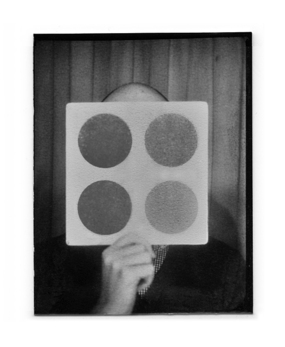
James Goggin, Passport Photo Colour Test, Rainbo Club, Chicago, November 30, 2011
James Goggin: Who Am I?
Jul 19, 2012
(6pm)
Talk
Please RSVP
Goggin will explore the evolving definition of and possibilities for identity in graphic design, from an ongoing questioning of cultural identity since his peripatetic childhood, to a current interest in institutional identity with his work in progress at the Museum of Contemporary Art Chicago. An argument for identity as a critical and speculative platform will be made with illustrated case studies in contemporary art and architecture from his design practice in the UK and the Netherlands, alongside current design and publishing at MCA Chicago and a recent exhibition project in France involving an identity which questions the very need for identities.
James Goggin founded graphic design studio Practise in 1999 upon graduation from London’s Royal College of Art. After 10 years in London, the studio moved to Arnhem, the Netherlands, where he combined commissioned projects with teaching at postgraduate design school Werkplaats Typografie, alongside monthly lecturing in history and theory at ECAL (University of Art and Design Lausanne), Switzerland. In August 2010, James took up the Director of Design, Publishing, and New Media position at the Museum of Contemporary Art in Chicago, where he now lives and works.
Previous clients include Camden Arts Centre, David Kohn Architects, Frieze, Phaidon, Tate Modern, Transport for London, and Victoria & Albert Museum. James lectures, runs workshops, and is a visiting critic at various art institutions and design schools in Europe, Australasia, and the United States, and regularly writes for international publications and journals. Typefaces designed by James are distributed by Swiss type foundry Lineto.
For more information on the exhibition, Zak Kyes Working With..., click here.

Joseph Hammer
Jun 16, 2012
(8pm)
Performance
RSVP Required
Los Angeles musician Joseph Hammer returns to Lampo this month in a follow up to his 2007 performance of “Road Less Traveled.” Hammer (b. 1959, Hollywood, CA) has performed widely and contributed to the Los Angeles underground music community since the early 1980s. Notably, Hammer participated in the Los Angeles Free Music Society (LAFMS), a loose collective of LA-based experimental musicians active through the 1970s and 1980s, and co-founded groups Points of Friction, Dinosaurs with Horns, and the trio Solid Eye. His practice draws on the complexities of the process of listening and playing, using music as it influences our notions of time, memory and intimacy as the basis for improvisation and abstraction.
Wearing white cotton gloves, Hammer physically manipulates computerized sources that have been abstracted as tape loops on vintage magnetic audio gear, a high fidelity, full-track mono analog tape recorder serving as his primary instrument. He uses a series of real-time mechanical interventions to transform and layer the source material, physically manipulating the degree of exposure of the tape loops and creating varying strata of old and new information on the loop of magnetic tape.
For this Lampo performance, the artist will premiere “Dynasty III,” the latest installment in his “Dynasty Suite” series, drawing widely-collaged source material from songs that make the artist cry. Come for the gorgeous plunderphonics; stay for a megadose of the lachrymose.
This performance is presented in partnership with Lampo. Founded in 1997, Lampo is a non-profit organization for experimental music, sound art and intermedia projects.

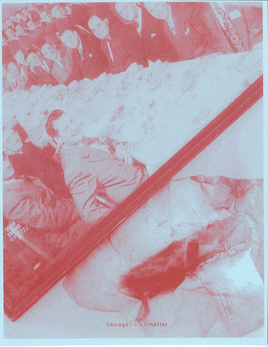
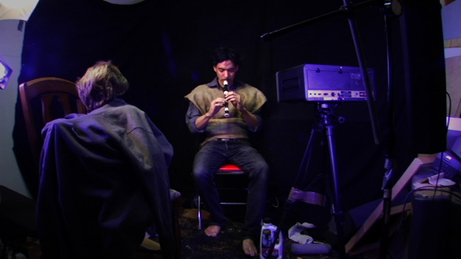
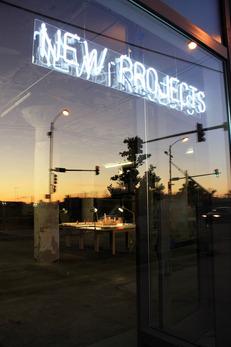

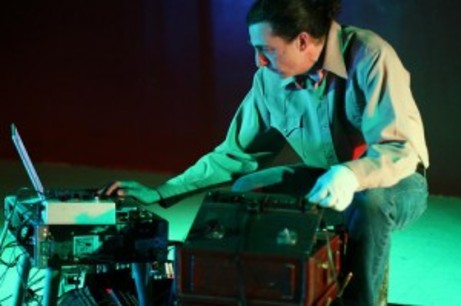
 PREVIOUS POSTS
PREVIOUS POSTS